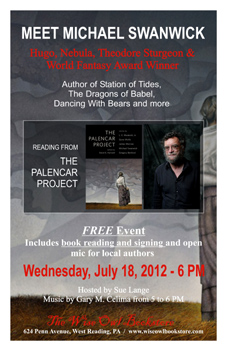.
So little is known about
Amos Tutuola! Yet he was one of the great fantasists of the Twentieth Century. Partly our ignorance is due to the racist expectations of many Western readers. Partly it's due to an understandable suspicion on the part of Nigerians that his work was being appreciated by Westerners for all the wrong reason. Mostly, though, it's due to the fact that in the forty-five years between publication of his first book,
The Palm-Wine Drinkard, and his death in 1997, nobody thought to repeatedly interview the man, his relatives, old-timers who knew him as a boy, and send out folklorists, videographers, and ethnologists to track down all the strands of influence and biography that went into his work.
But Tutuola was one of us, a fantasist, and it's very rare for a fantasist to be taken seriously while he or she is still alive.
I'm going to be on a panel about Tutuola this weekend, and I hope to learn more about him. In the meantime, here's a brief memorial I wrote for
Locus when he died:
AMOS TUTUOLA: AN APPRECIATION
One of the great fantasists has fallen, and most of us in the field never even knew he existed. But Amos Tutuola, a tribesman of the Yoruba people in Nigeria and author of several books, most notably The Palm-Wine Drinkard, My Life in the Bush of Ghosts, and The Brave African Huntress, was one of the best writers of fantasy in world literature.
Tutuola's fictions were, in Dylan Thomas's words, "thronged, grisley and bewitching," filled with strange creatures, magic, horror, and humor. He wrote in an oddly-cadenced and strangely-phrased English. For added emphasis he wrote words LARGER, as if he were telling a story aloud and had suddenly raised his voice to startle and alarm his listeners. For good reason: Tutuola was first-generation literate, a man who grew up in an oral culture and then managed to transplant some of its power onto the written page.
I do not know if Amos Tutuola was a literary genius or merely a conduit for the storytelling genius of his people. But to read The Palm-Wine Drinkard is to be transported back to one's first rapturous connection with literature, to that initial visceral encounter with Dickens or Nabokov or Austen that revealed what a marvelous and admirable thing fiction could be. Stripped of all familiarity, lacking the critical terminology that helps to explain and domesticate great literature (for, make no mistake about it, the underlying principles and conventions of his vastly entertaining fictions are not those of literature derived from European models), the story becomes strange again, enigmatic, and beauteous. We lack the language to explicate its appeal. But critical words are not needed. His stories speak to the soul.
Amos Tutuola discovered his vocation shortly after World War II, upon his release from military service as a coppersmith with the British army. He chanced to buy a magazine containing an advertisement for a collection of Yoruba tales. As he later recounted in an autobiographical essay, his immediate reaction was, "But Eh! By the way, when I was at school I was a good taleteller! Why, could I not write my own? Ooh, I am very good at this thing." The following day he started to write The Palm-Wine Drinkard.
It was extraordinary luck that Tutuola was published at all. As he explained:
Well, I wrote the script of Palm-Wine and kept it in the house. I didn't know where to send it to. Again, the following quarter I bought another magazine of the same type. Fortunately when I read it, I got to where it advertised "Manuscripts Wanted" overseas. Well then! Immediately I sent my story to the advertiser. When my script got to them they wrote in about two weeks saying that they did not accept manuscripts which were not concerned with religion, Christian religion. But, they would not return my manuscript. They would find a publisher for me because the story was strange to them that they would not be happy if they returned it to me.
The book appeared quietly in 1952, and has been in print ever since. It has been translated into at least fifteen languages. Tutuola's work is now widely taught throughout the world, and has had a strong influence not just in literature, but in dance, the visual arts, and music as well. Brian Eno and David Byrne's My Life in the Bush of Ghosts is probably the most famous work inspired by Tutuola's oeuvre, but there are many more.
Amos Tutuola was 77 when he died from hypertension and diabetes. I shall always regret that I never had the opportunity to meet the man. What excellent company he must have been! What a fine laugh he must have had.
*

















